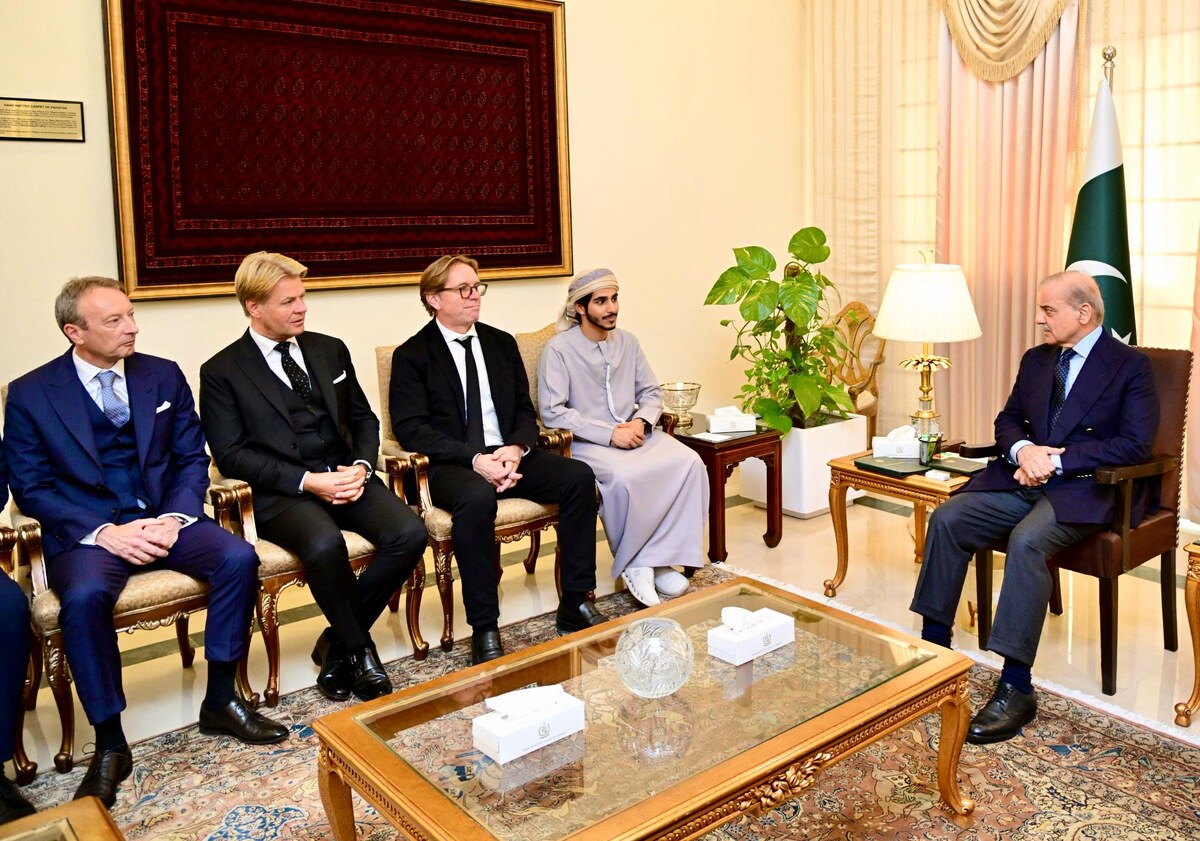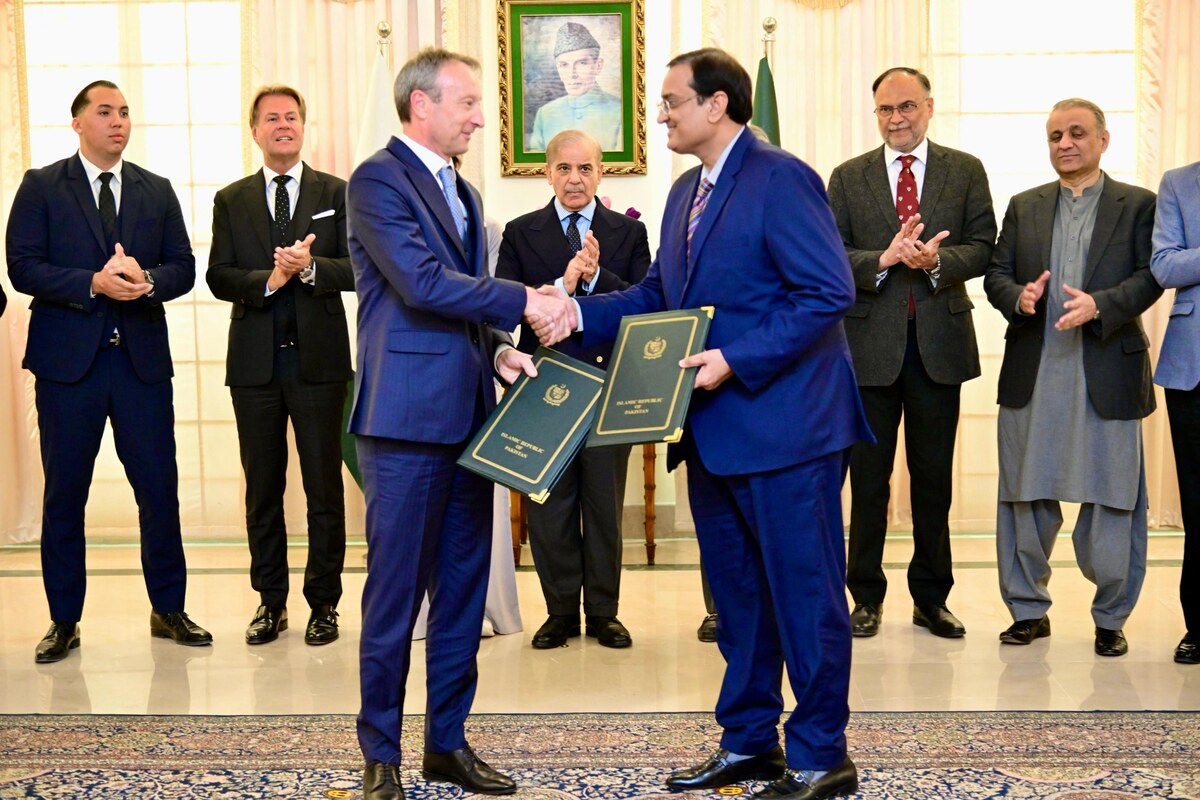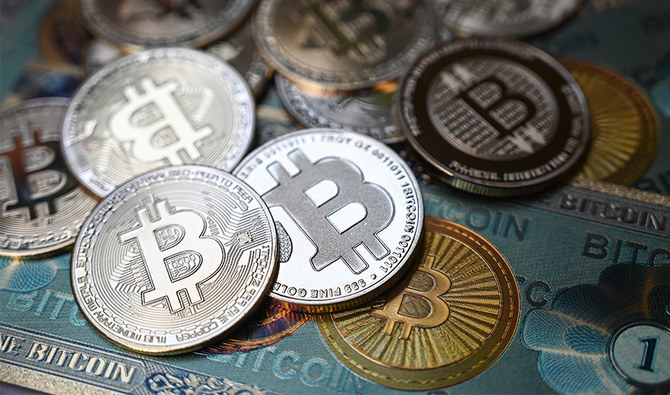KARACHI/ ISLAMABAD: A committee formed by the Sindh High Court last year on Wednesday submitted a report before the court recommending a “complete ban” on all cryptocurrencies in the country, officials with direct knowledge of the document said.
Last year, the Sindh High Court ordered the government to form a high-level committee to review the legal status of cryptocurrencies. The order came as part of a hearing in a petition demanding that the court declare null and void a State Bank of Pakistan order dated April 6, 2018, in which it advised banks and payment system operators to “refrain from processing, using, trading, holding, transferring value, promoting and investing in virtual currencies/tokens.”
An official at the central bank — who declined to be identified as the report submitted before the court has not yet been made public — told Arab News the committee identified several risks related to cryptocurrency and made two recommendations to the bank.
“A complete ban on all cryptocurrencies and other related activities in the country,” the bank recommended in a report seen by Arab News. “Unauthorized operations of crypto exchanges to be banned and penalties be imposed by the federal government.”
A second central bank official also confirmed that the report submitted with the Sindh High Court had recommended a ban on cryptocurrencies.
Among the risks of cryptocurrencies, the committee said regulators had not yet sufficiently addressed the phenomenon of cryptocurrencies or settled on a collective approach on the innovation.
The central bank also has concerns over the trading of cryptocurrency by individuals and entities “as it results in outflow of foreign exchanges from the country.”
Consumer protection and lack of legal resource was another concern, the committee noted, saying it was “highly likely that price volatility [would] expose its holders to huge monetary losses.”
The committee also said there was a risk of enforcement due to multiple jurisdiction: “Cryptocurrencies are borderless and there anonymous and pseudonymous nature increases the difficulty of implementing the regulatory and monitoring tools for regulating entity.”
The committee noted that a number of frauds had been reported recently in cryptocurrency exchanges and the investigation and seizure of the assets in the decentralized system had proved difficult.
The committee’s recommendations come amid a $100 million scandal in Pakistan in which Binance, a cryptocurrency exchange which is the largest exchange in the world in terms of daily trading volume of cryptocurrencies, is believed to have swindled thousands of clients.
Court-mandated committee recommends ‘complete ban’ on cryptocurrency in Pakistan
https://arab.news/n5dsw
Court-mandated committee recommends ‘complete ban’ on cryptocurrency in Pakistan

- Last year, Sindh High Court ordered government to form high-level committee to review legal status of cryptocurrencies
- Committee’s recommendation comes amid scandal in Pakistan in which Binance is believed to be involved in $100 million fraud
Four killed in southwestern Pakistan as IED explosion targets tribal elder

- IED explosion in Khuzdar district targeted tribal elder Samad Sumalani, say deputy commissioner and police official
- No group has claimed responsibility for attack but suspicion is likely to fall on separatist Baloch Liberation Army
QUETTA: At least four persons were killed and four others were injured on Wednesday when an improvised explosive device (IED) explosion targeted a tribal elder in southwestern Pakistan, a police and government official confirmed.
The blast occurred in Naal, a small town located 55 kilometers from Khuzdar city in Pakistan’s restive southwestern Balochistan province on Wednesday.
Yasir Iqbal Dashti, Khuzdar deputy commissioner, told Arab News that the explosion was caused by explosives fitted inside a motorcycle. A Baloch tribal elder Samad Sumalani was the target of the attack, Dashti said.
“Four people were killed and four others injured after the IED exploded in a crowded street of Naal town,” Dashti said.
Bahawal Khan Pandrani, the station house officer (SHO) of the Naal Police Station, said unknown persons parked the explosive-laden motorbike near a garage where Sumalani was repairing his vehicle at the Naal Bazaar. Sumalani suffered minor injuries in the attack, he said.
“Two vehicles and two motorbikes caught fire after the blast and turned into ashes,” Pandrani said.
No group immediately claimed responsibility for the attack but suspicion is likely to fall on ethnic Baloch separatist groups, mainly the Baloch Liberation Army (BLA), which often target tribal elders they see as backed by the state.
Gas-and-rich Balochistan, which shares porous borders with Iran and Afghanistan, has long faced a low-level insurgency led by separatist groups like the BLA, who accuse Islamabad of exploiting the province’s natural resources, such as gold and copper, while neglecting the local population.
Pakistani governments deny these allegations, saying that it has prioritized Balochistan’s development through investments in health, education and infrastructure projects.
The BLA has emerged as a significant security threat in recent years, carrying out major attacks in Balochistan and Sindh provinces while targeting security forces, ethnic Punjabis and Chinese nationals working on development projects.
The latest attack in Khuzdar happened two days after a suicide attack targeting Pakistan’s security forces in Balochistan’s Kalat, carried out by a woman, killed one paramilitary soldier and injured four others.
Pakistan PM discusses investment opportunities with UAE’s International Free Zones Authority

- UAE’s IFZA to invest in several existing projects of Pakistan’s special economic zones, says Prime Minister’s Office
- UAE delegation expresses keen interest in further expanding investment footprint in Pakistan, says Sharif’s office
ISLAMABAD: Prime Minister Shehbaz Sharif on Wednesday met a delegation of the UAE’s International Free Zones Authority (IFZA) to discuss investment opportunities in Pakistan’s special economic zones (SEZs), a statement from Sharif’s office said.
Pakistan has attempted to attract foreign investment from regional partners such as China and the UAE through its SEZs. These zones are intended to function as zones of rapid economic growth by using tax and business incentives to attract foreign investment and technology.
Sharif met an eight-member delegation of the IFZA, a UAE business setup authority that provides licensing and regulatory services for companies operating within its jurisdiction, and Aleria in Islamabad, the Prime Minister’s Office (PMO) said. The meeting was attended by IFZA Chairman Martin Gregers Pederson and Ilaria Managing Partner Mana Ali Muhammad Hammad Al Shamsi, along with officials from both organizations.
“Pakistan has vast investment opportunities in several sectors,” Sharif was quoted as saying. “The government is taking steps on a priority basis to provide a business and investment-friendly environment in the country.”

The delegation praised Pakistan’s economic stability under Sharif’s leadership and said that the country is emerging as the most suitable market for investment in the region, the PMO said.
“The delegation expressed keen interest in further expanding its investment footprint in Pakistan,” the statement added.

After the meeting, a memorandum of understanding (MoU) was also exchanged between Pakistan’s Board of Investment (BoI) and the IFZA on investment in Pakistan’s existing SEZs, the PMO said.
UAE’s IFZA will invest in several projects in Pakistan’s existing SEZs, the statement said.
The UAE is Pakistan’s third-largest trading partner after China and the United States and a major source of foreign investment, valued at over $10 billion in the last 20 years, according to the Gulf country’s foreign ministry.
Pakistan and the UAE have stepped up efforts in recent years to strengthen economic relations. Last year the two countries signed multiple agreements exceeding $3 billion for cooperation in railways, economic zones, and infrastructure development.
Pakistan’s top trade body demands 500 bps interest rate cut as inflation hits nine-year low

- FPCCI says businesses are dissatisfied with monetary policy since interest rates remain excessively high
- It says monetary policy should be aligned with government’s vision for economic and export-led growth
KARACHI: Pakistan’s top trade and industry body on Wednesday called for a 500-basis-point (bps) cut in the policy rate, saying businesses remained dissatisfied with monetary policy and viewed interest rates as excessively high despite inflation hitting a nine-year low.
Earlier this month, the government announced inflation had fallen to 1.5 percent in February, down from 2.4 percent in January. However, the Federation of Pakistan Chambers of Commerce and Industry (FPCCI) noted the policy rate remained at 12 percent following what it called a “grossly-insufficient reduction of merely 100 bps” in the January 27 Monetary Policy Committee (MPC) meeting.
“After deliberations across all industries and sectors, FPCCI demands an immediate and single-stroke rate cut of 500 basis points in the upcoming MPC meeting on March 10, 2025, to rationalize the monetary policy,” FPCCI President Atif Ikram Sheikh said in a statement.
He added the country’s monetary policy should align with the Special Investment Facilitation Council (SIFC) and the government’s broader vision for economic and export-led growth.
Sheikh said industry estimates suggest core inflation will remain between 1-3 percent in the fourth quarter of FY25 (April-June 2025) due to declining prices and easing inflationary pressures.
He argued with international oil prices expected to stay stable, the government had the conditions necessary to announce a substantial rate cut.
FPCCI Senior Vice President Saquib Fayyaz Magoon also urged policymakers to bring interest rates into single digits to allow Pakistani exporters to compete internationally.
He added that a rate cut should be accompanied by the government’s promised rationalization of electricity tariffs for industries to ensure sustainable growth.
Pakistan has historically maintained a tight monetary stance to curb inflation and stabilize the economy, but the latest calls for aggressive easing highlight growing concerns from businesses over stagnating investment and sluggish industrial activity.
Pakistan, UAE resolve to enhance cooperation after Abu Dhabi crown prince’s visit

- Pakistan signed cooperation agreements in banking, mining and railways with UAE during crown prince’s visit last week
- UAE is Pakistan’s third-largest trading partner after China and the United States, and a major source of foreign investment
ISLAMABAD: Pakistan’s Foreign Minister Ishaq Dar and United Arab Emirates Foreign Minister Sheikh Abdullah bin Zayed Al Nahyan on Wednesday resolved to enhance bilateral cooperation in all sectors, state-run media reported, following Abu Dhabi crown prince’s recent visit to Pakistan.
Crown Prince Sheikh Khaled bin Mohamed bin Zayed Al Nahyan visited Pakistan on his first official visit to the country on Feb. 27 with a high-level delegation. During the visit, both countries signed key agreements to boost cooperation in mining, railways, banking and infrastructure sectors.
Dar, who is also his country’s deputy prime minister, received a phone call from the UAE foreign minister on Wednesday during which the latter conveyed Ramadan greetings to the former and the people of Pakistan, the state-run Associated Press of Pakistan (APP) reported.
“Deputy Prime Minister and Foreign Minister Senator Mohammad Ishaq Dar, and UAE Deputy PM/ Foreign Minister Sheikh Abdullah bin Zayed Al Nahyan on Wednesday reaffirmed their commitment to enhancing bilateral cooperation across all sectors,” APP said.
“The two leaders also discussed the results of the recent visit by the Crown Prince of the UAE to Pakistan,” it added.
Dar also extended Ramadan wishes to the UAE foreign minister and expressed solidarity with the people of the Gulf country.
The UAE is Pakistan’s third-largest trading partner after China and the United States and a major source of foreign investment, valued at over $10 billion in the last 20 years, according to the Gulf country’s foreign ministry.
Pakistan and the UAE have stepped up efforts in recent years to strengthen economic relations. Last year the two countries signed multiple agreements exceeding $3 billion for cooperation in railways, economic zones, and infrastructure development.
Policymakers in Pakistan consider the UAE an optimal export destination due to its geographical proximity, which minimizes transportation and freight costs while facilitating commercial transactions.
The UAE is also home to more than a million Pakistani expatriates, making it the second-largest Pakistani expatriate community worldwide and a major source of foreign workers’ remittances.
Animal welfare organization, authorities rescue dancing bear ‘Sunny’ from abuse in Pakistan

- FOUR PAWS relocates Sunny, 3, from Jhang district to Islamabad rescue and rehabilitation center
- Sunny’s teeth were removed, she is emaciated and in an anxious mental state, says veterinarian
KARACHI: International animal rights organization FOUR PAWS said on Wednesday it had rescued a three-year-old female dancing bear from abuse in eastern Pakistan and relocated her to the country’s capital city where she is undergoing treatment.
The development takes place days after FOUR PAWS and local authorities rescued a seven-year-old black bear ‘Rocky’ after finding out that he had been kept illegally in Punjab province and abused in 35 fights. Local authorities had intervened to move him to a safer facility.
FOUR PAWS said it came to know about Sunny during a meeting with the adviser to the prime minister of change and environment, who received information about the successful confiscation of a female bear that had been abused as a dancing bear.
“The FOUR PAWS experts lost no time and made the 400-kilometer journey to Jhang district to provide urgent help for three-year-old dancing bear Sunny together with a team from the Islamabad Wildlife Management Board (IWMB),” the animal welfare organization said in a press release.

FOUR PAWS said it arrived in Jhang after facing a challenging night-time journey through many villages with “bad road conditions” during heavy rains and thunderstorms.
It said after 15 hours the team arrived at the location where Sunny was kept, provided her first aid, and set about returning to Islamabad to bring the bear to the Islamabad Wildlife Management Board (IWMB) Rescue and Rehabilitation Center.
FOUR PAWS veterinarian Dr. Amir Khalil said the team would conduct a thorough veterinary assessment of the bear.

“We saw that her teeth had been removed, which is a cruel practice that left her defenseless,” Dr. Khalil said in a statement. “She is emaciated and in an anxious mental state but we will make sure she gets all the care she urgently needs.”
Dr. Khalil provided an update on the rescued bear Rocky, saying that he was recovering “very well” and is eating and drinking and adjusting to his new environment. The veterinarian said Rocky will stay in quarantine for the next few days until his new enclosure is finalized.
“We’ve also given him painkillers and antibiotics to support his recovery,” Dr. Khalil said. “The rescues of Rocky and Sunny are another successful collaboration effort between FOUR PAWS, IWMB, and the Pakistani authorities.”
Pakistan has a troubled history with animal welfare. Last December, an elephant died at a safari park less than two weeks after being reunited with her sister. It was the latest tragedy to affect elephants in captivity in Pakistan.
In 2020, a pair of sick and badly neglected dancing Himalayan brown bears left a notorious zoo in Islamabad for a sanctuary in Jordan.















